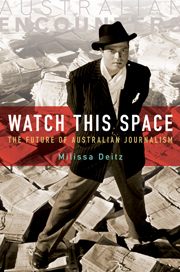Book contents
- Frontmatter
- Contents
- Acknowledgements
- Encountering Australian journalism
- Preface
- Dedication
- Introduction
- 1 The history of the future of journalism
- 2 Private versus public media
- 3 This is not news
- 4 The media virus
- 5 We're all journalists now
- 6 Conclusion – unfinished business
- Notes
- Index
- Australian Encounters series
Encountering Australian journalism
- Frontmatter
- Contents
- Acknowledgements
- Encountering Australian journalism
- Preface
- Dedication
- Introduction
- 1 The history of the future of journalism
- 2 Private versus public media
- 3 This is not news
- 4 The media virus
- 5 We're all journalists now
- 6 Conclusion – unfinished business
- Notes
- Index
- Australian Encounters series
Summary
The Cambridge University Press Australian Encounters series comes at an important time in our national life, when the old orthodoxies of left and right are proving inadequate to understand or remedy the challenges facing Australia. In each volume, readers will encounter new research and thinking by scholars and public intellectuals about an issue or problem confronting Australia that refreshes our public debate and aids civic renewal. One aim is to provide a bridge between academics undertaking innovative research in our universities and readers seeking new ideas beyond the homilies of media pundits and politicians.
Journalism is a mode of investigation and analysis that Australians, like other moderns, rely upon to interrogate their society. But lately, journalism itself has become the subject of interrogation. In conferences and speeches, blogs and tweets, the question being asked is: will journalism survive? This is an important question for Australian democracy, and the subject of this volume, Watch This Space. There is no shortage of critics who believe our enthusiasm for sourcing and sharing information over the internet has delivered a death blow to the markets, business models and standards that have long sustained journalism across the traditional media platforms of print, radio and television.
- Type
- Chapter
- Information
- Watch This SpaceThe Future of Australian Journalism, pp. vii - xPublisher: Cambridge University PressPrint publication year: 2010



